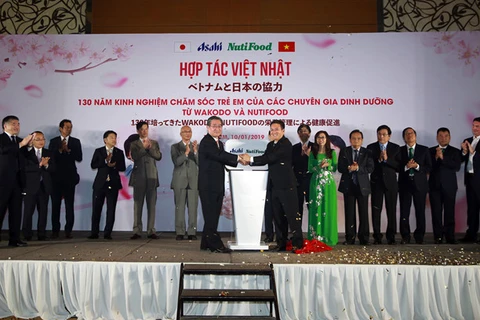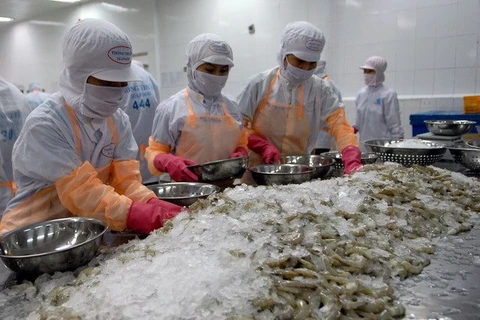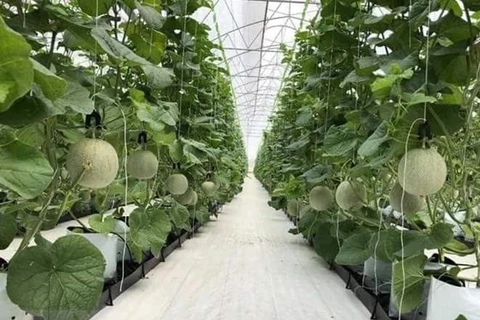Hanoi (VNS/VNA) - The domestic dairy industry will face competitive pressure this year due to the Comprehensive and Progressive Agreement for Trans-Pacific Partnership (CPTPP), according to a report of the Rong Viet Securities Company (VDSC).
The VDSC believes that Vietnam’s dairy brands will face fierce competition from foreign brands because when the CPTPP came into effect in Vietnam on January 14, import tariffs on dairy products from New Zealand, Singapore and Japan were cut to zero, making these product lines more competitive.
In addition, local consumers are more concerned about their own health and have improved awareness of nutritional products so they have become more demanding. They now prefer high-quality, organic milk products as well as those from walnuts and macadamia nuts. Meanwhile, demand for reconstituted milk has decreased, according to the report.
This is also the current consumption trend in developed markets like the US and the European Union (EU).
However, the current high-end product line still accounts for just a small proportion of the total milk supply in Vietnam. As much as 70 percent of milk on the domestic market is traditional reconstituted milk with much lower nutritional value than fresh milk.
The ndh.vn website quoted the VDSC report as saying that dairy companies will take a long time to change product structures to follow market demand.
It said the long-term growth trend of the dairy industry is still positive. Milk consumption per capita in Vietnam is still at low of 26 litres per person per year compared to other countries in the region, such as 35 litres in Thailand and 45 litres in Singapore.
At the same time, other factors such as the large, young, quickly growing population and increasing incomes of the middle class will promote demand for milk in the long term.
To meet higher future demand, dairy processing enterprises in Vietnam have expanded dairy farms to increase milk supplies.
However, according to the VDSC report, companies from New Zealand, Singapore, Malaysia and Japan also want to access Vietnamese milk market, reported vneconomy.vn.
Under CPTPP, Japan will have more access to Vietnam’s dairy market in the coming years.
Recently, Japanese Asahi Group has co-operated with NutiFood, a Vietnamese food and nutrition company, to set up a join venture in January that will bring Japanese nutrition products to Vietnamese children.
Shoyama Katsuo, chairman of Asahi Group Foods, said Vietnam is a potential market so his group plans to bring more its products to the local market under this joint venture.
Other global dairy brands that entered Vietnam’s market many years ago such as Abbott, Friesland Campina, Mead Johnson, Nestle and some small milk brands, have promoted investment in marketing, research and development of new products for the local market.
At present, Vinamilk leads in market share at about 27 percent while Abbott is second with 17 percent, followed by Friesland Campina with 12 percent.-VNS/VNA
The VDSC believes that Vietnam’s dairy brands will face fierce competition from foreign brands because when the CPTPP came into effect in Vietnam on January 14, import tariffs on dairy products from New Zealand, Singapore and Japan were cut to zero, making these product lines more competitive.
In addition, local consumers are more concerned about their own health and have improved awareness of nutritional products so they have become more demanding. They now prefer high-quality, organic milk products as well as those from walnuts and macadamia nuts. Meanwhile, demand for reconstituted milk has decreased, according to the report.
This is also the current consumption trend in developed markets like the US and the European Union (EU).
However, the current high-end product line still accounts for just a small proportion of the total milk supply in Vietnam. As much as 70 percent of milk on the domestic market is traditional reconstituted milk with much lower nutritional value than fresh milk.
The ndh.vn website quoted the VDSC report as saying that dairy companies will take a long time to change product structures to follow market demand.
It said the long-term growth trend of the dairy industry is still positive. Milk consumption per capita in Vietnam is still at low of 26 litres per person per year compared to other countries in the region, such as 35 litres in Thailand and 45 litres in Singapore.
At the same time, other factors such as the large, young, quickly growing population and increasing incomes of the middle class will promote demand for milk in the long term.
To meet higher future demand, dairy processing enterprises in Vietnam have expanded dairy farms to increase milk supplies.
However, according to the VDSC report, companies from New Zealand, Singapore, Malaysia and Japan also want to access Vietnamese milk market, reported vneconomy.vn.
Under CPTPP, Japan will have more access to Vietnam’s dairy market in the coming years.
Recently, Japanese Asahi Group has co-operated with NutiFood, a Vietnamese food and nutrition company, to set up a join venture in January that will bring Japanese nutrition products to Vietnamese children.
Shoyama Katsuo, chairman of Asahi Group Foods, said Vietnam is a potential market so his group plans to bring more its products to the local market under this joint venture.
Other global dairy brands that entered Vietnam’s market many years ago such as Abbott, Friesland Campina, Mead Johnson, Nestle and some small milk brands, have promoted investment in marketing, research and development of new products for the local market.
At present, Vinamilk leads in market share at about 27 percent while Abbott is second with 17 percent, followed by Friesland Campina with 12 percent.-VNS/VNA
VNA
























